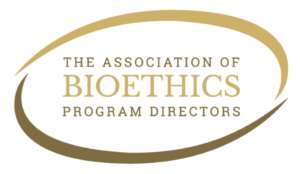by Lindsay Zausmer Feuerman, BA and Amy McGuire JD, Ph.D.1
An increasing number of universities offer undergraduate courses and even majors in the fields of bioethics and medical humanities. Yet, for students wanting to pursue advanced degrees in these fields, it is often difficult to know which educational program is best for them. In the absence of an accrediting agency for the field, it can be challenging to track and directly compare the various degree-granting programs. The Association of Bioethics Program Directors (ABPD) believes it is uniquely positioned to help address this.
ABPD represents the leadership of over 70 academic bioethics programs across North America. Members of ABPD direct many of the bioethics educational programs offered in the United States and Canada. Recognizing the diversity of educational opportunities available and the evolving nature of the field, ABPD set out to develop an open source resource that systematically tracks which bioethics educational programs exist and key features of each.
Graduate Bioethics Education Crowdsourcing Project
ABPD is utilizing a crowdsourcing method to collect standard information in order to capture the dynamic characteristics of each educational program. This approach enables program directors or their coordinators to directly enter, edit, and maintain data about their programs over time.
 ABPD initiated a task force group to develop a standard series of questions for four types of graduate-level educational programs: Certificate (e.g., graduate certificate program in bioethics), Masters (e.g., Master of Science degree in bioethics or a Master of Arts degree in philosophy with a focus in bioethics), Doctorate (e.g., PhD program in bioethics), and Fellowship (e.g., pre-doctoral or post-doctoral fellowship in bioethics). The ability to collect uniform data from all the programs has generated a robust database.This unique and user-friendly application enables users to search and sort data in one place as opposed to scouring the individual programs’ websites to find key information. As of October 2018, there are already 60 program entries from 32 cities around the world.
ABPD initiated a task force group to develop a standard series of questions for four types of graduate-level educational programs: Certificate (e.g., graduate certificate program in bioethics), Masters (e.g., Master of Science degree in bioethics or a Master of Arts degree in philosophy with a focus in bioethics), Doctorate (e.g., PhD program in bioethics), and Fellowship (e.g., pre-doctoral or post-doctoral fellowship in bioethics). The ability to collect uniform data from all the programs has generated a robust database.This unique and user-friendly application enables users to search and sort data in one place as opposed to scouring the individual programs’ websites to find key information. As of October 2018, there are already 60 program entries from 32 cities around the world.
Given the crowdsourcing nature of this project, success relies on participants. While ABPD members are directors of centers and departments at many of the institutions that house these academic programs, it is not exhaustive, and we encourage the widespread circulation of this survey to other programs not represented. ABPD has also partnered with other professional bioethics groups such as the American Society for Bioethics and Humanities and the Hastings Center to cross-link and support each other’s efforts in presenting various bioethics educational programs.
Call to Action
In order to ensure the database is as comprehensive and up-to-date as possible, we are constantly looking for both additional entrants and uptake from students.
- Institution:Are you an institution that offers advanced training in bioethics? Complete this survey to feature your certificate, master ‘s, doctoral, and/or fellowship program in this new community resource!
- Students:Are you a student interested in pursuing advanced training in bioethics? Check out this database of graduate and post-graduate education opportunities in bioethics!
Future Work
This database was developed specifically to help with advanced training in bioethics recruitment, but there are numerous other opportunities to leverage it. Our hope is that people will integrate the database to:
- Survey program alumni to determine job placement and what they are doing with their degrees
- Code the curriculum of the various degrees to evaluate commonalities and discordance
- Assess which clinical ethics fellowship programs are aligned with the training standards ABPD set forth and/or determine which are preparing trainees for the Healthcare Ethics Consultant-Certified (HEC-C) program
- Expand the survey to assess other educational programs such as intensive trainings and undergraduate and medical school education in bioethics/humanities
- Develop the crowdsourcing infrastructure so prospective and current students as well as alumni can connect and share their experiences
We invite you to learn more about the steps ABPD is taking to serve the needs of bioethics programs and their directors. Visit the ABPD website to learn more about resources available and interact with this crowdsourcing project.
1 The authors are writing as officers and staff of The Association Bioethics Program Directors